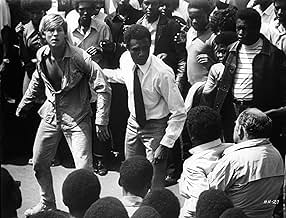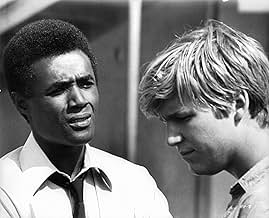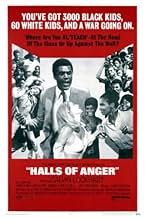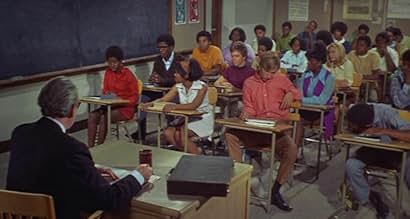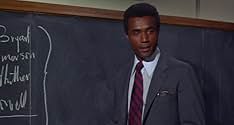IMDb RATING
5.9/10
471
YOUR RATING
An all-black inner city school has to become an integrated school. Few dozen white kids are transferred there, but the black students are aggressively opposed to this. The school then approa... Read allAn all-black inner city school has to become an integrated school. Few dozen white kids are transferred there, but the black students are aggressively opposed to this. The school then approaches a tough black teacher for help.An all-black inner city school has to become an integrated school. Few dozen white kids are transferred there, but the black students are aggressively opposed to this. The school then approaches a tough black teacher for help.
- Director
- Writers
- Stars
Otis Day
- Lerone Johnson
- (as Dewayne Jessie)
Paris Earl
- Carter
- (as Paris Earle)
Randy Brooks
- Sabin
- (as Randy Fredericks)
- Director
- Writers
- All cast & crew
- Production, box office & more at IMDbPro
Featured reviews
Having attended a Tennessee high school during the seventies, I can attest to the fairly realistic portrayal of race relations during that time. Actually, I witnessed incidents that were more violent than those portrayed in this film. The anger that the blacks displayed in the movie was very close to the emotions that I witnessed first hand. I did not appreciate at the time how difficult it was for the faculty to deal with the volatile atmosphere from day to day but as an adult watching this film, I realize how hard that job was. I agree that the non PC slant of this film keeps it a product of it's time. Regardless of this, I think that this film represents a small time capsule of realism from a time that has luckily long passed.
This film essentially begins in Los Angeles with a high school English teacher by the name of "Quincy Davis" (Calvin Lockhart) being asked to transfer from a relatively affluent high school to an inner-city school on the other side of town. After inquiring about their reasons, he is told that about 200 white students are being involuntarily bussed into this all-black school and--because he is black and a popular former professional basketball player--they feel that he would be best able to calm any racial tensions on the part of the black students there. However, when he gets there, he discovers that only a few dozen white students have actually transferred and the racial animosity on the part of the black student body is much higher than anybody realized. Now, rather than reveal any more I will just say that I was initially very impressed with this film. At least for the first 30 minutes or so. Unfortunately, the story then became extremely one-sided after that as it soon appeared that Quincy was more concerned about influencing one particular student named "J. T. Watson" (James A. Watson Jr.) than he was about protecting white students from serious physical violence. At least, that's how it seemed to me. Be that as it may, while this isn't necessarily a bad picture, there several other movies like "Lean on Me" or "Blackboard Jungle" which cover the plight of inner-city schools much better and I have rated this particular film accordingly. Slightly below average.
White students are being bused into an inner city all black school. The students aren't happy with it...will violence erupt?
This movie dealt with a very hot topic in 1970 that doesn't really exist anymore. The plot (and characters) and the the racism angle are played very broadly and simplistically. There's also a needless and very ugly sequence in which five black girls attack and tear all the clothes off a white girl. Aside from that scene and some mild profanity this plays like a made-for-TV movie--a BAD one! The confrontations, dialogue and resolutions are all too obvious. ALMOST worth seeing for a very young Jeff Bridges and Rob Reiner.
Trivia: This movie was banned from Boston TV stations in the early 70s. Opposition to busing was very violent in the city and officials were afraid the movie might incite riots.
This movie dealt with a very hot topic in 1970 that doesn't really exist anymore. The plot (and characters) and the the racism angle are played very broadly and simplistically. There's also a needless and very ugly sequence in which five black girls attack and tear all the clothes off a white girl. Aside from that scene and some mild profanity this plays like a made-for-TV movie--a BAD one! The confrontations, dialogue and resolutions are all too obvious. ALMOST worth seeing for a very young Jeff Bridges and Rob Reiner.
Trivia: This movie was banned from Boston TV stations in the early 70s. Opposition to busing was very violent in the city and officials were afraid the movie might incite riots.
One of many films in the early 1970s dealing with race relations and social changes. You have a predominately African-American high school being integrated by white teens. There are also teachers and their trials and tribulations with knucklehead students. I believe this is one of the earliest films Jeff Bridges starred in as an adult (he was one of the students).
While there is nothing really bad about how anything in the movie is executed, just about any viewer will repeatedly think "I've seen this before" several times before the end credits. Still, you do get to see a young Bridges and Reiner, and there are some good moments, like the interesting way the chief character gets his students interested in reading. The ending is also more realistic for a refreshing change.
More interesting is the movie makes the gutsy non-P.C. decision to show many of these urban black students in a negative light, from their almost constant abuse of the white students to showing how many of them are poor at reading and studying. In fact, even though the white students are shown to have their own negative characteristics, they overall come across better than their black classmates.
More interesting is the movie makes the gutsy non-P.C. decision to show many of these urban black students in a negative light, from their almost constant abuse of the white students to showing how many of them are poor at reading and studying. In fact, even though the white students are shown to have their own negative characteristics, they overall come across better than their black classmates.
Did you know
- Alternate versionsThe attack on the white girl in the girl's locker room towards the end of the film was cut out of TV broadcasts.
- ConnectionsFeatured in Casting By (2012)
- How long is Halls of Anger?Powered by Alexa
Details
- Runtime1 hour 36 minutes
- Color
- Aspect ratio
- 1.85 : 1
Contribute to this page
Suggest an edit or add missing content



